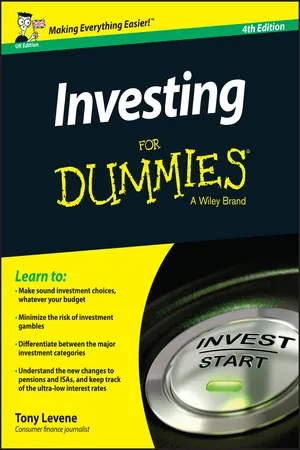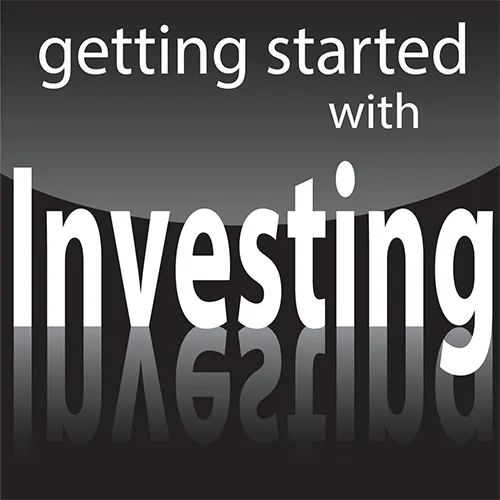
- English
- ePUB (mobile friendly)
- Available on iOS & Android
Investing for Dummies - UK
About This Book
The easy way to demystify the intimidating world of investing in the UK market Think investing is only for the super-rich? Think again! Packed with tons of expert advice, Investing For Dummies UK 4 th edition shows you step-by-step how to make sound, sensible investment choices—whatever your budget. All the major investment categories are covered for the smart beginner, while more advanced and alternative investments are presented for the more adventurous and experienced. Wherever you fall on the investing spectrum, there's something for you!
This new UKeditionof Investing For Dummies has been updated with the latest financial information, including all the new trends and developments that have affected the world of investment, with an emphasis on the new pensions legislations and changes to Individual Savings Accounts. Whether you're interested in assessing your financial means, gauging risks and returns or increasing your personal wealth, with the help of this friendly guide, you no longer need to work in finance to make sense of the facts and figures behind your investments!
- Offers tips on how to minimize the risk of investment gambles
- Covers the FCA's more stringent risk analysis for investors using advisers
- Contains new sections on pensions, ISAs, the DIY/self-directed investor, and ultra-low interest rates
- Includes new online templates to help simplify the investing process
If you want to go it alone in the investment arena, but need the support of a straightforward, reassuring guide to help you make the best decisions—and get the highest returns from your investments—this is the book for you.
Frequently asked questions
Information
Getting Started with Investing

- Find out all the things you always wanted to know about investing.
- Discover what the term investment really means.
- Look at the five basic investment choices – the foundation of most portfolios.
- Discover how to increase the benefits and shrink the drawbacks of investment choices.
- Learn that the small print is vital in understanding what you invest in – ignore it at your peril!
First Steps on the Money Trail




What’s Your Reason for Investing?
- You have no money but want to make some. Most people fall into this category. You want to invest some money and accumulate funds but don’t know where to start. How you go about it depends on how well you can discipline yourself. Take heart, though: even the most confirmed shopaholic can build up a nest-egg for later use.
- You have some money, want it to make more and currently make your own investment decisions. You’re the traditional investor who wants to make your personal wealth grow. You already make your own investment decisions and want to get better at it. How you go about it depends on who you are, how you made your money and where you hope to be in 5, 10 or 20 years.
- You have some money, want it to make more and currently have others handle the investment process for you. Maybe you have fund managers or investment advisers handle your investments so you can gain tax advantages or because your savings are lumped together with those of others in a pension or similar fund. Or maybe your life is just too busy or complicated for you to do the investing yourself. Regardless, you now want to understand how investing works so you can either take over your own investment decisions or monitor what others are doing with your hard-earned cash. I’m not sure many people will pick up this book just to check up on the professionals, but I could be wrong.
- You’re now in charge of your pension decisions. Unless you work in the public sector, the chances are that you now have to take stock of your own pension arrangements. What you get when you retire is now largely up to you rather than your former employer or employers. And the new pension freedoms extend this choice into your retirement years. Because building up and then winding down a pension are likely to be the biggest investment decisions you make, Chapters 14 and 15 are devoted to helping you construct your retirement funds and then make the most of your pension’s nest-egg.
What’s Your Personality Type with Money?
Spenders have fun
- You don’t look forward to the end of the month.
- You love new things: you’ll queue all night for the latest smartphone and your friends gasp when you tell them how much your new handbag cost.
- You have more than one credit card – maybe you use one to pay for the other.
- You can’t resist two-for-one offers, even if you throw half of what you buy away.
- You buy unnecessary clothes.
- You’re always first – and last – to buy a round of drinks.
- You believe in living a lot now.
- You see the future as a foreign land.
- You worry about money at times but then go out to the shops to stop fretting.
- You buy glossy magazines as much for the advertisements as the articles.
Savers have cash
- You have a surplus at the end of each month.
- You go to the supermarket with a shopping list.
- You don’t have a credit card, or you pay it off in full each month.
- You’re prepared to put off purchases.
- You’d rather buy second-hand than run up a debt.
- Your property is more important than your furniture.
- You look at the display windows at banks and building societies.
- You know what the current interest rates are.
- You believe in the saying ‘waste not, want not’.
- You’ve read Sorting out Your Finances For Dummies (published by Wiley) – or, if you haven’t, you’ll get a copy the next time you buy a book.
Investors build up future funds
- You have spare cash.
- You have an emergency fund for the day the roof falls down or the car collapses.
- You want more than the bank or building society offers.
- You think about your money-making strategy and tactics.
- You can face up to bad days (and there’ll always be some) on investment markets without worry.
- You’re ready to swap certitude for a bigger potential reward.
- You can afford to lock away your spare cash for five years at the very least.
- You understand what you’re doing with your money.
- You’re prepared to lose money occasionally – knowing it’s an occupational hazard.
- You’re ready to invest your time into growing your fortune.
Working out where you fit
- You decided you’re an investor. Congratulations! You’re ready to embark on the road to growing your money. It won’t be easy. You may face stiff climbs, vertiginous falls, rocky surfaces, long deviations and dead ends. But give it enough work and time, and I promise that investing will work out.
- You didn’t qualify as an investor. You got as far as a saver an...
Table of contents
- Cover
- Title Page
- Table of Contents
- Introduction
- Part I: Getting Started with Investing
- Part II: Shares, Bonds and Other Investibles
- Part III: Collective Investments and Pension Funds
- Part IV: Property and Alternatives
- Part V: The Part of Tens
- About the Author
- Cheat Sheet
- More Dummies Products
- End User License Agreement

